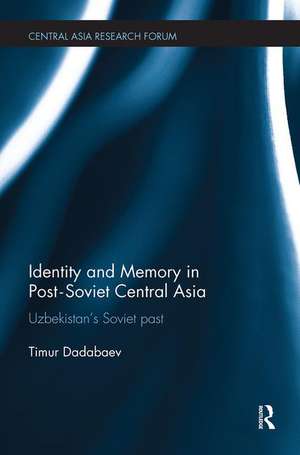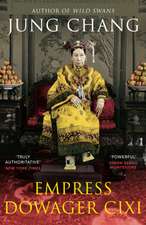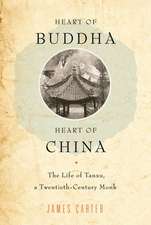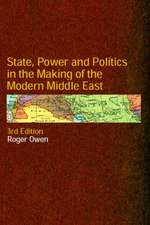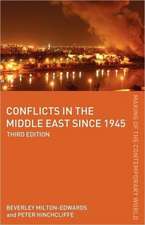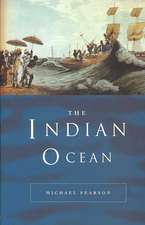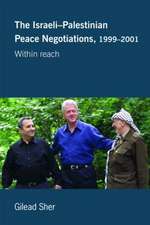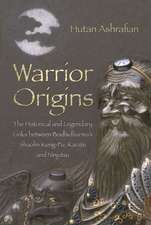Identity and Memory in Post-Soviet Central Asia: Uzbekistan's Soviet Past: Central Asia Research Forum
Autor Timur Dadabaeven Limba Engleză Paperback – 22 ian 2018
Identity and Memory in Post-Soviet Central Asia looks at the tradition of history construction in Central Asia. By collecting views of the public’s experiences of the Soviet past in Uzbekistan, the author examines the transformation of present-day Central Asia from the perspective of these personal memories, and analyses how they relate to the Soviet and post-Soviet official descriptions of Soviet life. The book discusses that the way in which people in Central Asia reconcile their Soviet past to a great extent refers to the three-fold process of recollecting their everyday experiences, reflecting on their past from the perspective of their post-Soviet present, and re-imagining. These three elements influence memories and lead to selectivity in memory construction, emphasising the aspects of the Soviet era people choose to recall in positive and negative lights.
Presenting a broader picture of Soviet everyday life at the periphery of the USSR, the book will be a useful contribution for students and scholars of Central Asian Studies, Ethnicity and Identity Politics.
| Toate formatele și edițiile | Preț | Express |
|---|---|---|
| Paperback (1) | 449.41 lei 6-8 săpt. | |
| Taylor & Francis – 22 ian 2018 | 449.41 lei 6-8 săpt. | |
| Hardback (1) | 1109.21 lei 6-8 săpt. | |
| Taylor & Francis – 6 aug 2015 | 1109.21 lei 6-8 săpt. |
Din seria Central Asia Research Forum
-
 Preț: 443.09 lei
Preț: 443.09 lei -
 Preț: 436.14 lei
Preț: 436.14 lei - 18%
 Preț: 1000.27 lei
Preț: 1000.27 lei - 18%
 Preț: 1000.58 lei
Preț: 1000.58 lei -
 Preț: 416.22 lei
Preț: 416.22 lei -
 Preț: 468.36 lei
Preț: 468.36 lei - 14%
 Preț: 336.82 lei
Preț: 336.82 lei -
 Preț: 496.01 lei
Preț: 496.01 lei -
 Preț: 416.22 lei
Preț: 416.22 lei -
 Preț: 412.86 lei
Preț: 412.86 lei -
 Preț: 416.22 lei
Preț: 416.22 lei -
 Preț: 411.42 lei
Preț: 411.42 lei -
 Preț: 416.96 lei
Preț: 416.96 lei - 12%
 Preț: 299.52 lei
Preț: 299.52 lei -
 Preț: 283.54 lei
Preț: 283.54 lei -
 Preț: 416.22 lei
Preț: 416.22 lei -
 Preț: 413.37 lei
Preț: 413.37 lei -
 Preț: 436.14 lei
Preț: 436.14 lei - 15%
 Preț: 431.19 lei
Preț: 431.19 lei - 18%
 Preț: 272.50 lei
Preț: 272.50 lei - 20%
 Preț: 262.14 lei
Preț: 262.14 lei -
 Preț: 413.13 lei
Preț: 413.13 lei -
 Preț: 421.02 lei
Preț: 421.02 lei -
 Preț: 412.27 lei
Preț: 412.27 lei -
 Preț: 197.90 lei
Preț: 197.90 lei -
 Preț: 486.38 lei
Preț: 486.38 lei -
 Preț: 278.13 lei
Preț: 278.13 lei - 17%
 Preț: 259.98 lei
Preț: 259.98 lei
Preț: 449.41 lei
Nou
Puncte Express: 674
Preț estimativ în valută:
86.01€ • 89.46$ • 71.00£
86.01€ • 89.46$ • 71.00£
Carte tipărită la comandă
Livrare economică 12-26 aprilie
Preluare comenzi: 021 569.72.76
Specificații
ISBN-13: 9781138493353
ISBN-10: 113849335X
Pagini: 226
Ilustrații: 2
Dimensiuni: 156 x 234 x 12 mm
Greutate: 0.45 kg
Ediția:1
Editura: Taylor & Francis
Colecția Routledge
Seria Central Asia Research Forum
Locul publicării:Oxford, United Kingdom
ISBN-10: 113849335X
Pagini: 226
Ilustrații: 2
Dimensiuni: 156 x 234 x 12 mm
Greutate: 0.45 kg
Ediția:1
Editura: Taylor & Francis
Colecția Routledge
Seria Central Asia Research Forum
Locul publicării:Oxford, United Kingdom
Public țintă
PostgraduateCuprins
1. Selectivity in Recalling Soviet Past in Uzbekistan: Re-collecting, Reflecting and Re-imagining 2. Power, Social Life, and Public Memory in Uzbekistan 3. Recollections of Trauma and Public Responses to the Political Violence of State Policies in the Stalinist Era in Uzbekistan 4. The impact of World War II /Greater Patriotic War in Uzbekistan 5. Death of Stalin: Time of Despair and Hope 6 Post-Soviet Nostalgia in Central Asia: Oral Accounts of Everyday Life in Soviet Uzbekistan 7. Hybrid Ethnic Identities in Soviet Uzbekistan 8. Religiosity and Soviet 'modernisation' in Central Asia: Locating religious traditions and rituals in recollections of antireligious policies in Uzbekistan 9. Placing the Mahalla between Public and Private Life
Notă biografică
Timur Dadabaev is an Associate Professor at the Graduate School of Social Sciences and Humanities, University of Tsukuba, Japan and Adjunct Associate Professor at the Graduate School of Humanities and Sociology, University of Tokyo, Japan.
Descriere
Identity and Memory in Post-Soviet Central Asia looks at the tradition of history construction in Central Asia. By collecting views of the public’s experiences of the Soviet past in Uzbekistan, the author examines the transformation of present-day Central Asia from the perspective of these personal memories, and analyses how they relate to the Soviet and post-Soviet official descriptions of Soviet life. The book discusses that the way in which people in Central Asia reconcile their Soviet past to a great extent refers to the three-fold process of recollecting their everyday experiences, reflecting on their past from the perspective of their post-Soviet present, and re-imagining.
